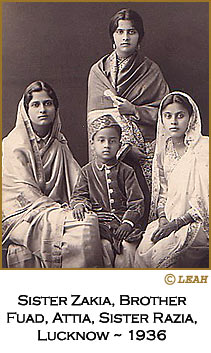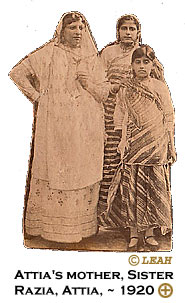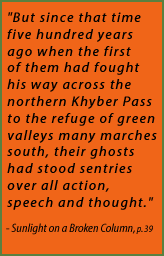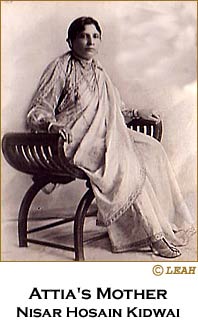1. Growing Up in Gadia Attia Hosain was interviewed in London on May 19, 1991  QUESTION: Where were you born and where did you grew up? QUESTION: Where were you born and where did you grew up?ATTIA HOSAIN: I was born in Lucknow[in 1913]. I was brought up there. I was educated there. Q: What did your father do? AH: My father [Shahid Hosain Kidwai, ] was a Taluqdar [feudal landholder of Gadia, District Bari Banki, United Provinces]. He was also one of those people who was involved in his life politically a time [in the 1910s] when it wasn't a question of confronting the British as happened later when Gandhiji came on the scene. It was when there were questions in the minds of all the people who were interested in the country's future independence, how to go about it. He was ahead of his time in many ways.  I remember him not as much as I should because he died when I was not quite eleven. He had come to Cambridge, now let us see, it would be the end of the last century. He was about 18 years old and he had come [to England]. He was the only son. He did have a half-brother but he was the Taluqdar himself. He had come to England and briefly gone to Oxford for some reason for a term or so and then went to Cambridge. He was at Christ's [College, Cambridge]. After that he became a Barrister after going to the Middle Temple [UK].
I remember him not as much as I should because he died when I was not quite eleven. He had come to Cambridge, now let us see, it would be the end of the last century. He was about 18 years old and he had come [to England]. He was the only son. He did have a half-brother but he was the Taluqdar himself. He had come to England and briefly gone to Oxford for some reason for a term or so and then went to Cambridge. He was at Christ's [College, Cambridge]. After that he became a Barrister after going to the Middle Temple [UK].
His friends were all people of that time who became very prominent later, north, south, east and west of India because at the time you can imagine there was a different kind of person who came here. They were all finally rather important, or part of the country's history, or fighting for independence. But I remember most of them, as we used to say "uncles" and Mrs. [Sarojini] Naidu [Indian national poet] - not calling her aunt because I never dared to address her. I adored her. But I did know her from when I was very young. Begum Attia Faizi [another prominent artist and intellectual], I knew her from when I was a child. All these people who later on, I now realise, became a part of a historical movement. It is very hard for me to remember names, but Ali Imam, Abbas Ali Baig, Sir Sultan Ahmad, people in Aligarh. Above all my hero was Panditji [Jawaharlal Nehru, India first Prime Minister] father. He was the son of father's friend, Moti Lal Nehru, a very close friend. Therefore I grew up in an atmosphere where people spoke of what to do next, how to be involved, not only in the national movements but in the community, one had to be a part of it. At that time the Taluqdars had a kind of a trade union called the "British-Indian Association." My father was very deeply involved with it. Then my uncles, his cousins who were [brothers] in our forms of relationship, as you know there is no difference between that and really uncles in the sense "Chacha". It didn't matter, first cousins [were like brothers and sisters]. They were also Taluqdars. Gadia [a district in north India's United Provinces, or U.P.] had two Taluqdaries. They [my uncle's family] were one part of it, and my father was the other. Q: And your mother?  AH: My mother came from one of those distinguished intellectual families that belong to a place called Kakori. At that time all those people believed that if you owned land, it led to problems within the family, which alas I know now do exist still. My mother came from that kind of a family where they were proud of being people of learning and became judges, and professionals, that sort of life they had. These great big houses - you can see the ruins of them now because most of the Kakori people seemed to have left and gone to Pakistan. AH: My mother came from one of those distinguished intellectual families that belong to a place called Kakori. At that time all those people believed that if you owned land, it led to problems within the family, which alas I know now do exist still. My mother came from that kind of a family where they were proud of being people of learning and became judges, and professionals, that sort of life they had. These great big houses - you can see the ruins of them now because most of the Kakori people seemed to have left and gone to Pakistan.My mother grew up with that atmosphere around her, so that I was used to having in our home, as we grew up, people who behaved as if they were in salons where poets could sit - the poets being ones own relatives because everybody felt that they had to compose poetry or be interested in classical music or anything that had to do with culture. I was fortunate I had that background. > Image © The Literary Estate of Attia Hosain (LEAH) |
| SOUNDS
| HOME